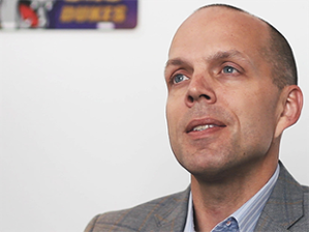Keeping teachers effective amidst constant change
EducationTaking On Tomorrow - Episode 1: Fostering Future TeachersTaking On Tomorrow, a new series, showcases how JMU professors are working to overcome the challenges of the future. Today we're featuring Dr. David Slykhuis, and the work he's doing to foster teachers of tomorrow. Read more: bit.ly/JMUTeachTomorrow
Posted by James Madison University on Friday, October 2, 2015
In August, the nonprofit organization TNTP reported on results of a two-year study it did on the effectiveness of professional development programs for K-12 teachers in America's schools. TNTP concluded, after conducting its research on 10,000 teachers in three large school networks and one charter school network, that, among other things, there was "no evidence that any particular kind or amount of professional development consistently helps teachers improve."
JMU's Dr. David Slykhuis, interim department head of educational foundations and exceptionalities and an associate professor of science education, says the situation is not nearly as bleak as the study indicates and that JMU's summer Content Teaching Academy, which Slykhuis has directed for six years, has proven to be an effective professional development program for teachers.
Q: We know studies can be conducted and interpreted differently. What do you see as a weakness of the TNTP study?
A: The primary measure of professional development in this study was simply the hours spent in professional development activities. There was no measure if the professional development offered to the teachers was research based for effectiveness.
Q: And you also disagree with the way some of the findings were reported?
A: The money spent in all three school districts examined in this two-year study DID improve teacher performance. In fact 19-30 percent of the teachers met their most rigorous definition of improvement and these teachers were in 95 percent of the schools in the sample. They simply did not improve as much as the researchers had hoped.
Q: Studies like this are difficult to do. Why?
A: This speaks to the complex job of teaching and how it is very difficult to study in a controlled manner. Every day, every class, and every student, presents a new set of challenges that must be met by schools and teachers. These challenges aren’t systematic, and often can’t be anticipated, forcing schools and teachers to make difficult decisions.
Q: What would have made this study better?
A: The professional development in the research study took on the ‘spray and pray’ approach, appearing to offer a wide variety of professional development on ever changing topics. Instead, it should have been focused on one aspect of teacher practice with teachers participating in a sustained topic over an extended period of time while collaborating and working in small groups.
Q: How is JMU's Content Teaching Academy different from the professional development studied by TNTP?
A: Teachers attend this research-based professional development for one week over the summer. The week is intensive and is sustained throughout the school year online, and the teachers are placed in small academies for collaboration around a common topic.
Q: What results have you seen after teachers attend the Content Teaching Academy?
A: The evaluations by teachers who have attended the Content Teaching Academy are overwhelmingly positive and teachers often pay their own way to attend year after year. School districts know they are getting a high quality professional development and readily send multiple teachers.
Q: What are the main goals of the CTA?
A: The goals of the CTA are:
- To improve teachers' content knowledge within their disciplines.
- To improve teachers' ability to teach in content oriented classrooms.
- To assist teachers in designing lessons which integrate the use of technology into instruction.
- To increase teachers' ability to provide meaningful instruction for diverse learners.
- To assist teachers with designing instruction that incorporates critical thinking skills.
Q: Why is JMU a good place to host the CTA?
A: JMU provides a unique advantages to host the CTA for a couple of reasons. First is simply geography. Many teaches have not been to the valley and on campus and the CTA become more like a retreat and working vacation. Second, and most importantly, are the people. The CTA staff and academy chairs go above and beyond to ensure that all teachers attending have an excellent experience.
Q: Do you think the CTA model could be successful elsewhere?
A: It would be difficult to replicate the setting, facilities and people of the CTA here at JMU, but the model itself could be a blueprint for professional development for teachers elsewhere.

About this series:
Taking on Tomorrow was created to showcase the expertise, scholarship and research of faculty in all disciplines at Madison. A number of factors determine who will be in the spotlight at any given time and what aspect of their work will be highlighted. In this installment, we feature Dr. David Slykhuis, interim head of the department of educational foundations and exceptionalities in the College of Education.
To nominate a faculty member to be featured in "Taking on Tomorrow," please e-mail Eric Gorton at gortonej@jmu.edu. Please provide a brief explanation of why you are nominating this faculty member. Self nominations are encouraged.

Related Content:
Washington Post — Study: Billions of dollars in annual teacher training is largely a waste
Richmond Times — Soifer: Rethinking how to help teachers improve
Episode 2: Leah Kirkpatrick — Rethinking theater education
Episode 3: Dr. Paul Bogard — Embracing environmental writing

